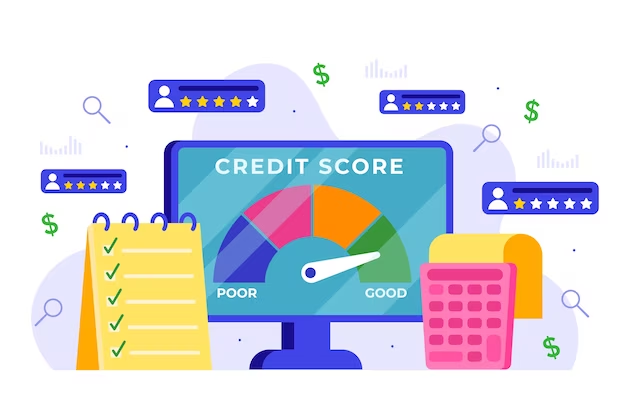The Al Etihad Credit Bureau (AECB) plays a pivotal role in the financial landscape of the United Arab Emirates by providing credit reports and credit scores that are critical for lenders when making decisions. A good al Etihad credit bureau score is essential for anyone looking to borrow money, whether it be for a personal loan, mortgage, or even getting favorable terms on credit cards. Generally, AECB scores range from 300 to 900, with a score above 700 often considered good, indicating a higher likelihood of getting approved for credit at the best rates.
How AECB Credit Scores Are Calculated
Credit History and Depth
AECB calculates credit scores by considering several factors, one of which is your credit history and depth. This includes the length of your credit history, the types of credit you’ve handled, and the amount of credit to which you’ve had access. Longer credit histories with a mix of credit types, such as credit cards, personal loans, and mortgages, typically contribute positively to your score.
Payment Behavior
Payment history has a substantial impact on your credit score. A solid record of on-time payments bolsters your score, while late payments, particularly those over 30 days past due, can significantly damage it. Consistency in payments signals to lenders that you are a reliable borrower.
Credit Exposure
Credit exposure refers to how much credit you are currently using. High exposure, especially nearing your credit limits, can negatively affect your score. Ideally, maintaining a low credit utilization ratio – the amount of credit you are using compared to the credit available to you – is healthy for a good credit score.
Other Influencing Factors
Other factors include the frequency of credit applications and the number of new accounts opened. A flurry of new applications can temporarily bring down your score, as it may indicate to lenders that you are in urgent need of credit, which could imply financial instability.

The Importance of a Good AECB Credit Score
Improving Loan Approval Chances
A higher credit score can significantly improve your chances of loan approval. Lenders view applicants with good scores as low-risk, which means they’re more likely to grant you credit.
Benefiting from Lower Interest Rates
- Lower Interest on Loans: Lenders often offer lower interest rates to individuals with higher credit scores, as they pose a lower risk of default.
- Better Credit Card Offers: From low-interest rates to lucrative rewards programs, good credit can unlock many premium credit card offers.
Enhancing Your Financial Reputation
A good AECB credit score isn’t just about borrowing; it’s also a reflection of your overall financial health. A strong score indicates you manage your finances responsibly, which can be beneficial even for non-lending situations, such as when applying for rental properties or negotiating insurance premiums.
What Constitutes a Good Credit Score?
The AECB Credit Score Range
Understanding the range of AECB credit scores helps you gauge where you stand. The scores are broadly classified into the following categories:
- Poor: Below 620
- Fair: 620 – 679
- Good: 680 – 730
- Very Good: 731 – 780
- Excellent: Above 780
What Numbers Should You Aim For?
To maximize your financial opportunities, aiming for a score higher than 700 is advisable. This range increases your chances of being offered better interest rates and fewer borrowing restrictions. It’s worth noting that while the exact number for a good score might vary slightly among different lenders, consistently maintaining a score in the upper range is universally beneficial.
Factors That Can Impact Your AECB Credit Score
Late Payments and Defaults
A history of late payments or defaults is one of the quickest ways to lower your credit score. Even a single late payment can have a negative impact, and multiple occurrences can lead to a substantial drop in your score.
High Credit Card Utilization
Another significant factor is your credit card utilization rate. High utilization can be a red flag to creditors, signaling potential overspending or financial strain. It is generally recommended to keep the credit utilization rate below 30%.
Multiple Loan Enquiries
Every time you apply for credit, it results in a hard inquiry on your report, which can lower your score. The effect of each inquiry may be small, but multiple inquiries in a short period can add up, indicating to lenders that you may be a higher credit risk.

How to Check Your AECB Credit Score
Online AECB Credit Score Check
You can easily check your al Etihad credit bureau score online through the official AECB website or app. This process, referred to as how to get Etihad credit bureau report online, involves a straightforward procedure that requires some personal information and a nominal fee for generating the credit report. Reviewing this report regularly is an essential practice to stay informed of your credit status, detect errors early, and begin rectifying them.
For residents in the UAE wanting to check their credit score, the question “”how to check Etihad credit bureau score?”” has a simple answer: access the AECB’s online services. By doing so, you can take proactive steps in understanding and managing your financial footprint. Regular checks are an integral part of maintaining credit health and ensuring there are no surprises when you need to avail of financial services. It’s a good habit to periodically check your credit score UAE-based citizens, so potential issues can be addressed before affecting your ability to borrow.
Strategies to Improve Your AECB Credit Score
Improving your AECB credit score might seem like a daunting task, but with deliberate steps and financial discipline, it is entirely achievable. Here are some strategies to consider:
Timely Payments
Making payments on time is the most effective way to improve your credit score. Set calendar reminders or automate bill payments to ensure you never miss a due date. Every on-time payment is a positive mark on your credit history, gradually bolstering your overall score.
Debt Management
Reduce your levels of debt, starting with high-interest accounts such as credit cards. Aim to pay off more than the minimum due each month, and avoid taking on new debt until your credit utilization ratio improves, which can both increase your score.
Regularly Monitoring Your Credit Score
Frequent review of your credit report allows you to identify and dispute any inaccuracies that might drag down your score. Awareness of your credit standing also helps you understand the effect of different financial behaviors on your score.
The Impact of a Poor Credit Score
Having a poor credit score can be severely limiting in various ways. It can deny you access to credit when you need it most or make borrowing an expensive ordeal.
Reduced Financial Options
A low credit score can shut you off from a world of financial opportunities. This could mean being unable to secure loans or getting rejected for credit cards. Lenders are less likely to trust individuals with poor credit, shrinking the scope of your financial maneuverability.
Higher Loan Costs
If you do manage to secure a loan with a poor credit score, expect to pay higher interest rates. These higher rates are the lender’s way of protecting themselves against the potential risk they perceive in lending to you. Over time, this means spending significantly more money than a person with a good credit score would, just to service your debt.
Maintaining a Good Credit Score Over Time
Sustaining a good credit score is a long-term commitment, and although it takes time and patience, the benefits are undeniable.
Consistency Is Key
The consistency with which you handle your financial obligations is crucial. Continue making payments on time, and maintain low balances on your credit accounts to demonstrate to lenders that you are a responsible borrower.
Addressing Any Credit Report Errors
Regularly check for and address errors in your credit report. Incorrect information can unjustly affect your score, and it’s within your rights to have mistakes corrected.
Good Financial Habits
Develop and stick to good financial habits, such as setting a budget, saving regularly, and not overextending yourself credit-wise. Such habits not only help in maintaining a good credit score but also promote overall financial well-being.

When to Seek Professional Help for Credit Score
There are situations when seeking professional assistance with your credit situation is the right move.
| Situation | Indicators |
|---|---|
| 1. High Debt Load | Struggling to manage existing debts, high credit card balances, and increasing debt-to-income ratio. |
| 2. Credit Report Errors | Identifying inaccuracies or errors on the credit report that may be negatively impacting the score. |
| 3. Financial Hardship | Facing financial challenges such as job loss, medical expenses, or other unexpected circumstances. |
| 4. Denied Credit Applications | Experiencing repeated rejections for credit applications due to a low credit score. |
| 5. Limited Credit History | Having a limited credit history and needing guidance on building credit responsibly. |
| 6. Interest Rate Concerns | Concerns about high-interest rates on existing loans or credit cards. |
| 7. Collection Accounts | Dealing with collection accounts and seeking strategies for resolution. |
| 8. Legal Issues | Facing legal actions related to debts and needing assistance in navigating legal processes. |
Credit Repair Services
If your credit score has suffered due to past mistakes and you’re finding it complicated to navigate the path to recovery, credit repair services can offer guidance. These services can advocate on your behalf to dispute and remove inaccuracies from your credit report.
Financial Advising and Planning
A financial advisor can help create a plan tailored to your individual circumstances to improve your credit score. This plan may involve debt consolidation or restructuring, savings strategies, and budget management to position you better with credit bureaus.
Overall
A good AECB credit score is more than just a number—it is a reflection of your financial trustworthiness and discipline. By understanding what affects your score, checking it regularly, and making smart financial decisions, you can ensure that your credit bureau report remains an asset to your financial life rather than a hindrance. It requires consistent effort and sometimes a bit of strategic planning, but the benefits of having a good credit score are well worth the perseverance.
FAQs
- What is the fastest way to raise my AECB credit score? The fastest way to raise your AECB credit score is to pay down existing debt quickly, particularly on revolving accounts like credit cards, and consistently pay all of your bills on time.
- Can checking my credit score too often damage it? No, checking your own credit score is considered a soft inquiry and does not affect your credit score. You can check as often as you like without concern.
- How long does it take for my credit score to improve after paying off debt? It can take one to two months for your credit report to update after paying off debt, but the exact time frame for a noticeable increase in your credit score can vary based on other factors in your credit history.
- What should I do if I find an error on my AECB credit report? If you spot an error, you should dispute it directly with the AECB. Provide them with evidence to support your claim, and they are obliged to investigate and rectify any verified mistakes.
- How can I check my credit score with the AECB? To check your al Etihad credit bureau score, you can visit their official website or use their mobile app to request your credit report. The process is straightforward, but remember that it may involve a fee.
